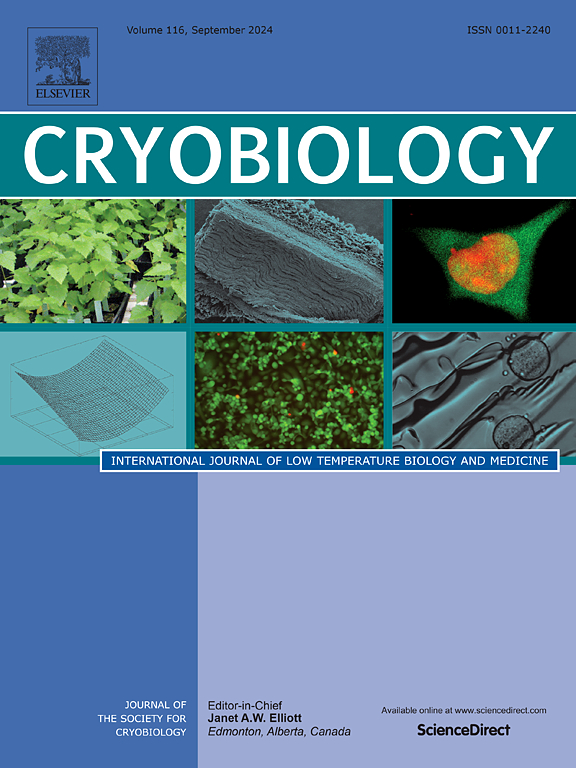Melatonin production improves Senegalese sole sperm motility at night, but fails as a supplement during cryopreservation
IF 2.3
3区 生物学
Q2 BIOLOGY
引用次数: 0
Abstract
Melatonin is a powerful antioxidant present in fish seminal plasma. This study aimed to understand melatonin's endogenous and exogenous effects on first-generation Senegalese sole sperm quality for sperm management applications. In the first experiment, samples were collected at mid-light (ML) and mid-dark (MD) daytimes, to evaluate the effects on sperm motility. In a second experiment, using confocal microscopy and melatonin-FITC, spermatozoa permeability to melatonin was evaluated and, after showing that it enters the nucleus and mitochondria by passive diffusion, exogenous melatonin toxicity and antioxidant potential during a cryopreservation assay were performed. The toxicity assay tested different melatonin concentrations (0.01, 0.1, 1, and 10 mM) and exposure times (3, 5, 15 and 30 min), and sperm motility parameters were measured (TM, PM, VCL, VSL, LIN) using CASA system. The best conditions (0.1 and 10 mM) were selected for the cryopreservation assay, and a set of post-thaw sperm quality analyses were performed (motility, viability, reactive oxygen species, lipid peroxidation, and DNA fragmentation). The motility analyzed at ML and MD showed significant differences in all parameters, mainly on velocities (VCL, VSL, VAP), that were significantly higher at MD. Supplemented melatonin did not influence spermatozoa motility, MDA content or DNA fragmentation, although a lower percentage of viable cells was obtained on the 10 mM treatment. Altogether, Senegalese sole spermatozoa motility was enhanced at night, putatively by endogenous melatonin through direct or indirect mechanisms, whereas supplemented melatonin did not confer extra protection during cryopreservation.
褪黑激素的产生可提高塞内加尔鳎目鱼精子在夜间的活力,但在冷冻保存期间不能作为一种补充剂。
褪黑素是一种存在于鱼类精浆中的强效抗氧化剂。本研究旨在了解褪黑激素对塞内加尔鳎鱼第一代精子质量的内源性和外源性影响,以用于精子管理。在第一项实验中,在中光(ML)和中暗(MD)采集样本,以评估对精子活力的影响。在第二项实验中,使用共聚焦显微镜和褪黑激素-FITC 评估了精子对褪黑激素的通透性,在证明褪黑激素通过被动扩散进入细胞核和线粒体后,进行了外源褪黑激素毒性和冷冻保存过程中的抗氧化潜力试验。毒性试验测试了不同的褪黑激素浓度(0.01、0.1、1 和 10 mM)和暴露时间(3、5、15 和 30 分钟),并使用 CASA 系统测量了精子活力参数(TM、PM、VCL、VSL、LIN)。选择最佳条件(0.1 和 10 mM)进行冷冻保存试验,并进行一系列解冻后精子质量分析(运动能力、存活率、活性氧、脂质过氧化和 DNA 断裂)。对ML和MD精子活力的分析表明,所有参数都存在显著差异,主要是速度(VCL、VSL、VAP),MD精子活力明显更高。补充褪黑素不会影响精子的运动能力、MDA 含量或 DNA 片段,尽管在 10 mM 的处理条件下,存活细胞的百分比较低。总之,塞内加尔鳎精子的运动能力在夜间得到增强,这可能是内源性褪黑激素通过直接或间接机制产生的作用,而补充褪黑激素并不能在冷冻保存期间提供额外的保护。
本文章由计算机程序翻译,如有差异,请以英文原文为准。
求助全文
约1分钟内获得全文
求助全文
来源期刊

Cryobiology
生物-生理学
CiteScore
5.40
自引率
7.40%
发文量
71
审稿时长
56 days
期刊介绍:
Cryobiology: International Journal of Low Temperature Biology and Medicine publishes research articles on all aspects of low temperature biology and medicine.
Research Areas include:
• Cryoprotective additives and their pharmacological actions
• Cryosurgery
• Freeze-drying
• Freezing
• Frost hardiness in plants
• Hibernation
• Hypothermia
• Medical applications of reduced temperature
• Perfusion of organs
• All pertinent methodologies
Cryobiology is the official journal of the Society for Cryobiology.
 求助内容:
求助内容: 应助结果提醒方式:
应助结果提醒方式:


